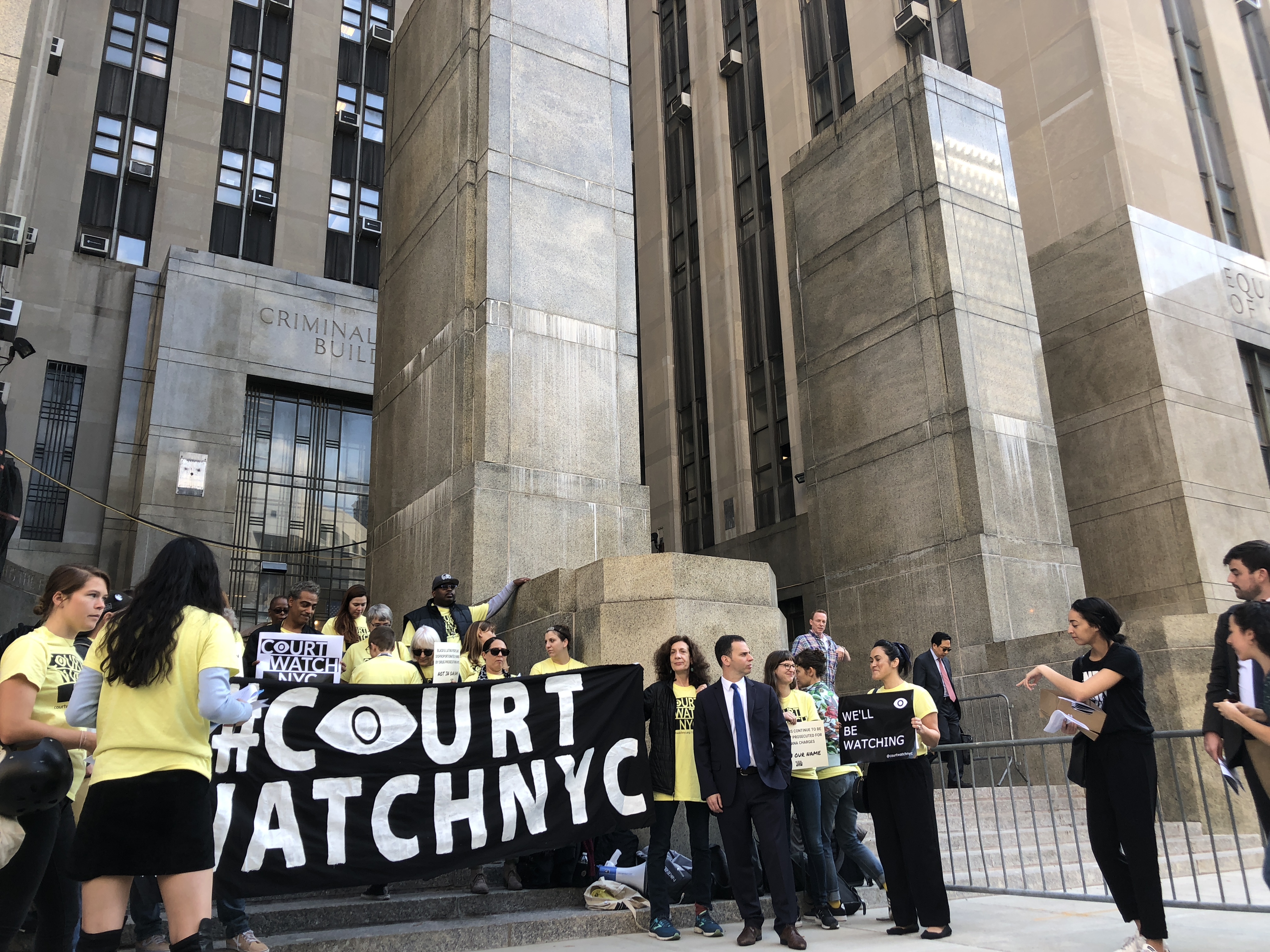The Brooklyn and Manhattan district attorneys are failing to live up to their superficially progressive marijuana policies, according to a new report released by Court Watch NYC.
At a November 1 rally in front of the Manhattan Criminal Court, Court Watch NYC—an organization that collects real-time data on public arraignments through trained volunteers—launched a zine to present the findings of the group. “Broken Promises: CWNYC Response to Drug Policing and Prosecution in NYC” shows that the district attorneys continue to prosecute misdemeanor marijuana charges by exploiting the exceptions to their policy commitments. (Scroll down to the bottom to read the full zine.)
In 2014, Kenneth Thompson, the Brooklyn DA at the time, promised to end “low-level” marijuana possession prosecutions with the caveat that defendants did not have a prior criminal record and were not selling the drug. As justification, former DA Thompson cited the inefficacy of these prosecutions in deterring crime, and their disproportionate impact on communities of color.
The policy, as reported by WNYC in 2017, did not live up to its potential. Marijuana-related prosecutions did not drop as significantly as expected, and were disproportionately enforced against black defendants.
This, in part, was due to Eric Gonzalez—who became acting DA in October 2016 after Thompson stepped down to be treated for cancer. In the beginning of 2018, however, Gonzalez committed to stop prosecuting these low-level charges. Court watchers saw “a significant drop” in marijuana cases beginning in August, though it “was clear to watchers that the policy was not being uniformly applied.”
Following suit on August 1, Manhattan DA Cyrus J. Vance launched a similar policy to end prosecutions of marijuana possession and smoking cases, while also stating that his office would seal past marijuana convictions.
The findings shared in “Broken Promises” belie the explicit policies of these two district attorneys. “Drug prosecutions in NYC disproportionately target Black and Latinx people,” the zine reports.
Even though black and white people share comparable marijuana use rates, “It’s Black and Latin people, one after the other, in court,” Court Watch volunteer Amanda Farrell told Filter. “I wasn’t quite prepared for the scale of it. Why are white [people] a majority in the city and a minority in the court?”
The numbers confirm her observation. The vast majority—85 percent—of Court Watch-observed defendants were people of color, according to the zine. On top of this disproportionate representation, the punishments imposed were also skewed: defendants of color were more likely to be assigned bail in comparison to their white counterparts (who are more likely to simply be released). Punishments also varied according to class: One of the report’s key findings is that poor or financially precarious defendants are subjected to “pretrial jailing … solely for the inability to pay.”
One vignette in the zine describes a Manhattan prosecutor requesting $10,000 bail on a homeless person accused of possession of a controlled substance.
Additionally, the Court Watch zine reports that “people continued to be arbitrarily prosecuted for marijuana-related charges.”
The Manhattan and Brooklyn DAs have exploited an exception to their policies. They say it’s fine for them to prosecute people for marijuana if “the individual otherwise poses a significant threat to public safety”—a caveat which is, of course, open to interpretation and often interpreted with bias.
Another problem cited by Court Watch is the lack of clarity and transparency during arraignments. “Even when you don’t have personal stakes in a case, it’s hard to pay attention to all the details,” says volunteer Nora Rawn. “A lot of times the ADAs do not specify the charges or the details around the arrest. The arraignment process is very cursory. There is almost no attempt to make sure the defendant understands.”
It’s not only the prosecutors that are problems. It’s the police too, and prosecutors unwillingness to stand up to them. Mayor Bill de Blasio has directed the NYPD to end marijuana arrests and instead issue criminal summonses, but the zine reports that “Police and prosecutors rely on entrapment and other predatory policing strategies to secure arrests and charges.”
One such predatory practice is referred to as “buy and bust,” where an undercover officer solicits a drug sale from a perceived drug user, in order to arrest them when they follow through. The zine asks the DAs: “Why is your office colluding with the NYPD and not challenging their predatory policing tactics that target people of color?”
The zine reveals that while the district attorneys spout progressive-sounding rhetoric, they continue to wield drug possession laws as a tool to attack poor people of color. It seems they’ll go to any lengths to not actually stop prosecuting people for low-level drug charges.
For example, since July 2018, when NY State law made various types of “synthetic marijuana” controlled substances, the Brooklyn and Manhattan DA offices have taken it as an opportunity to charge mere possession as a misdemeanor punishable by up to a year in jail. They’ve also charged the sale of synthetic marijuana as a felony, punishable with prison.
The report aims to hold the DAs—who act in “the name of the People of the State of New York”— accountable for their promises.
“This report is the first of many warnings to DAs Cy Vance and Eric Gonzalez that the people are watching.” Rawn declared during the rally. “Empty promises aren’t enough.”
Read the full zine here:
CWNYC+Drug+Zine+FOR+WEB




Show Comments